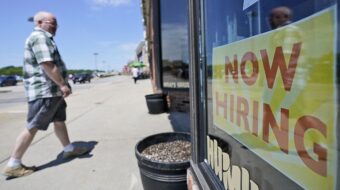Last September, employment in the United States fell off a cliff. It is still falling.
The economy had been losing jobs since the beginning of 2008, and the pace has been accelerating since the summer. Over the last three months, 1.8 million jobs were lost. That’s an annual rate of 5 percent, the worst since 1975. Just under 3 million jobs were lost in all of 2008, but we are on track to beat that before June of this year.
There are no credible signs that this will get better soon:
State and local government employment is usually a stabilizing factor, and over the past year government jobs have increased slightly while 3.6 million private sector jobs were lost. But emergency sessions in state capitols and city and town halls throughout the country, are meeting budget crises with hiring freezes and layoffs, which will take effect in the months to come.
Even if jobs in residential construction hit bottom (a big if), workers at big commercial construction projects will be laid off as jobs are finished, because new projects have been canceled or postponed.
Manufacturing employment will stay in free fall, reflecting the New York times headline “Factory Orders Fall Again With No Clear End in Sight.” The lost jobs, especially in auto, have been particularly important to African Americans, whose official unemployment rate has reached 12.6 percent, with a more realistic estimate above 20 percent.
Continued crisis in the financial industry means more closings and mergers, and consequent job loss, in banking, insurance and real estate. Unfortunately, along with the overpaid executives and traders, hundreds of thousands of secretaries, technicians and custodians are losing their jobs.
Working families smothered by debt and facing job loss are cutting spending to bare necessities. Service industries, from shopping malls to franchise restaurants to entertainment to nail salons to car washes, all of which expanded beyond any real need, have only begun to feel the effects. There will be a wave of closings and consolidations, with consequent job losses.
Finally, this is probably the first time since 1929 that an economic crisis has been so completely global in scope.
In the face of this, the arguments against the Economic Recovery Act have an Alice in Wonderland quality. As I write this, a bipartisan group of Senators is working on a cutting the plan in order to “focus it on spending that truly helps the economy,” according to Sen. Susan Collins (R-Maine). One of the cuts will strip $40 billion in aid to states from the Bill. What planet do these people live on?
In Collins’ state of Maine, the governor has just presented a budget that cuts spending by 13 percent, cuts hundreds of jobs and trims higher education. What Maine needs to “truly help the economy,” is for Congress to pass the Recovery Act without cuts, put the check in the mail, and then get to work on another round. The same goes for the state of Connecticut, facing massive cuts, whose senator, Joseph Lieberman (formerly a Democrat, now Independent), is part of the Collins gang. And the same goes for nearly every state in the country.
Even with the Recovery Act, unemployment will pass 9 percent — 14 million people — this year. The Act will not be perfect – it includes some spending on unnecessary tax cuts for business, and falls short on spending for areas like rail and mass transit. The main problem with the Recovery Act, according to economists like Nobel Prize winners Paul Krugman and Joseph Stiglitz, is that it is not big enough. But it will save or create a lot of jobs doing useful, productive work, and it will provide real help to many working class families.
The Recovery Act is like a temporary dike, thrown together in the path of a flood. It will not be enough, and the rising tide of unemployment and economic distress can sweep it away – unless it is reinforced. The recovery Act must be passed now, and followed up with other major efforts like universal health care, the Employee Free Choice Act, and additional investment in mass transit, education and other vital needs.











Comments